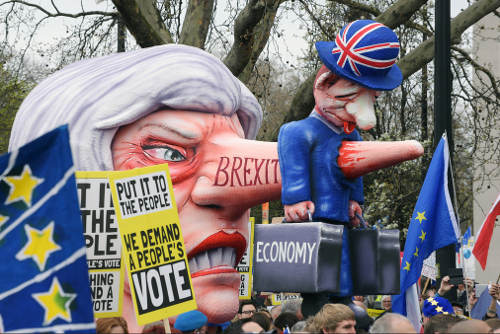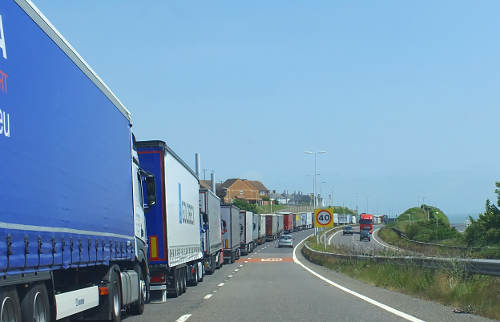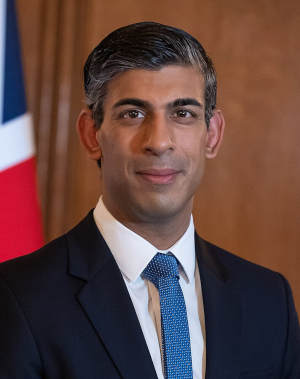
A short history of Brexit
How and why did it happen like this?
- Welcome
- Essential
Britain
- Accidents and emergencies
- Pounds and pennies
- Where to stay
- Hotels in London
- Hotel search
- Budget tourism - Britain on the cheap
- Driving in Britain
- Low-cost car-hire
- Travel by train in Britain
- Britain's main attractions
- Tourism by region
- Food and eating in Britain
- Online shopping from the UK
- Christmas in Britain
- English pubs
- Places
to visit
- Britain's main attractions
- Visiting London
- London for free
- Getting round in London
- Shopping in London
- More great English cities
- Oxford and Cambridge
- Best places to visit in southeast England
- Best places to visit in central southern England
- The West of England - Gloucestershire to Dorset
- The southwest - Devon and Cornwall
- Sites & heritage in the East of England
- About Scotland
- Attractions by theme
- Issues & institutions
About-Britain.com
- A thematic guide to the UK
Britain and Europe, from Churchill to Brexit
Why
did British Prime Minister
David Cameron organise a Brexit referendum, and how did we get to the
unexpected result and the events that followed
and will continue to follow ?
►
See also: The
British General Election 2024 - a short guide - background,
issues, parties and voting system.
Though neither the Conservatives nor the Labour party wanted to talk
about Brexit, the subject was in everyone's thoughts.
An overview of Brexit
In January 2020, almost four years after the Brexit referendum was held, Great Britain finally left the European Union. Why did it happen ?And what will the future bring?
By August 2023, less than a third of people in Britain still thought that Brexit was a good idea, but neither the ruling Conservative party nor the opposition Labour Party would publicly say so.... Brexit remained the "elephant in the room" that had poisoned British politics and public life, ever since the term was invented.
By 2025, less than ten years after the referendum, all opinion polls were showing that a large majority of people in Britain (up to 65% in some polls) now thought that Brexit has been a serious mistake.
On the morning of 1st February 2020, people in Britain woke up to the start of a new era. The UK was no longer a member of the European Union. In actual fact, it was not yet entirely out of the EU, but had entered a "transition period" that lasted until the final stages of the leaving process were completed, on January 31st 2021. Final? Maybe not. Complete? Maybe not.
Even before Britain left the EU, some of those who voted for Brexit were already doubting the wisdom of their choice, and joining the ranks of those who had voted against it. For a long time, even well before the referendum, there had been in Britain a third of the population who wanted and had always wanted to leave the EU, a third who considered Brexit to be the craziest idea to be envisaged by a government in the last few centuries, and a third who either didn't care, had little or no understanding of the implications, or just hesitated between being for and being against.
For years, UK opinion polls have always shown that public opinion was divided on the question of Britain's membership the EEC which later became the European Union. In general, pro-Europeans remained in the majority, but supporters of an isolationist Britain - sovereignists, neo-liberals, Marxists and others - still represented a strong minority.
More significantly, there remained a consensus among leaderships of the three major political parties, Conservatives, Labour and Liberals, that the UK's place was in the Common Market, later to become the European Union. On the other hand, there also remained within the two largest parties, Conservatives and Labour, the two parties of government since the 1920s, an anti-European fringe. In the Labour Party, left-wingers viewed the Common Market as a great capitalist plot. In the Conservatives, the right wing of the party - nostalgic imperialists, neo-liberals, libertarians and sovereignists - considered the Common Market, then even more so the European Union, as a big bureaucratic machine, an unwanted supra-national power and an assault on Britain's national sovereignty.
Britain and Europe since Churchill
In the history of European integration, Great Britain has been, and will remain in spite Brexit, a powerful influence. One of the first to rally around the idea of a united Europe was Churchill, who in 1930 supported the plan of French Prime Minister Aristide Briand advocating the creation of a "European federal union", about which Churchill wrote that he would see "nothing but good in a richer and freer European community". Later in his famous 1946 Zurich Speech, he laid out in more detail the path for the creation of a European community "united in a common heritage", concluding "We must build a kind of United States of Europe ".Not without reason, the European Union officially includes Churchill as one of the 11 founding fathers of European integration.
"Having
the English language laid out in such a user-friendly approach is a
welcome treat."
New edition 2023. Also in hardback from main EFL bookstores .Disponible aussi en français
However, a few years later, the first dealings
between Great Britain
and the Common Market were not of a kind to encourage a surge
of support among the British people in favour of this
"continental" body. Firstly the Common Market had been created in 1957
without the British, who initially believed that Britain - with the
remains of its Empire to look after - had no need of it ; later, when
Conservative prime minister MacMillan
submitted Britain's first
application to the EEC in 1963, that application was summarily swept
aside by the French president at the time, General de Gaulle.
De Gaulle
then did the same again four years later when the UK reapplied for
membership under the Labour government of Harold Wilson. This
second
"no" was generally viewed in the UK as a snub and an affront
from a man whom the country had welcomed as a refugee in London for
three years during the Second World War.New edition 2023. Also in hardback from main EFL bookstores .Disponible aussi en français
So when - after the death of De Gaulle - Conservative Prime Minister Edward Heath eventually took the UK into the EEC on January 1, 1973, it was without fireworks or popular jubilation.
On the contrary, the sovereignists and those who yearned back to the days of Empire, supported by part of the popular press, used the EEC as a scapegoat for everything that was wrong in Britain. Europe was portrayed as a costly adventure for Britain, adding to the cost of living by replacing butter produced by our efficient cousins in New Zealand, by butter costing twice the price, produced by inefficient farmers on the continent of Europe. The argument was very convincing, since at the beginning of 1973 a pound of butter cost on average £ 0.22 in a British supermarket, compard to £ 0.41 in Denmark, and £ 0.54 in France.
A year after the United Kingdom joined the EEC, and with the country in an increasingly difficult economic situation, the Conservatives were defeated in the 1974 elections, and replaced by a Labour government led by Harold Wilson . In the runup to the election, Wilson had promised to seriously review Britain's membership of the Common Market; once elected, he stood by this commitment, and organized the first referendum on Britain's membership of the Common Market, which took place a year later in 1975. Uncommitted on the European question while in opposition, Wilson had nevertheless become completely Europhile once in power and strongly urged voters to say "yes" to Europe in this first referendum. As a result, the British voted by a majority of 65% to remain in the Common Market.
For a decade after this first referendum, questions about Britain's membership of the EEC were off the political agenda. This did not prevent the widely distributed right-wing populist press, led by the Sun, the Daily Mail and the Daily Express, from waging their own campaign against what they saw as EEC absurdities and interference in the life of the British. Coverage of the EU in the tabloid press was lagely limited to fake or wildly exaggerated news stories about things like straight bananas and bendy cucumbers; and with little to no reporting about the positive achievements of the EEC, or its economic benefits, the Common Market was portrayed as little more than an absurd bureaucracy. Readers lapped it up. But politically, the position of Great Britain within Europe was accepted as a fait accompli; even the new Conservative Prime Minister, Margaret Thatcher, elected in 1979, did not question Britain's position as a member of the Common Market. On the contrary ; while admitting that certain aspects of governance and the role of the European authorities had to change, Thatcher still believed in Europe, and set to work to improve the EEC from the inside. In this she was remarkably successful.
Thatcher was even one of the architects of the transformation of the EEC into the European Union. History has already quickly forgotten (especially in Great Britain) that the Single European Act of 1985, setting out the path to the Treaty of Maastricht, was the result of close collaboration between Margaret Thatcher and Jacques Delors, and was largely drafted by the British Conservative European Commissioner Arthur Cockfield, specially appointed to this task by Margaret Thatcher.
Yet during her later years in power, Thatcher changed, and with it her perception of Europe changed too. The Single European Act was ratified in 1987. Shortly after, or even before, she began to have doubts about the direction in which European integration was going, about ideas of political integration and about a planned EU single currency. Her famous "Bruges Speech" delivered on September 20, 1988 is considered in British Eurosceptic circles as the starting point for the campaign to leave Europe. It was not. It was highly critical about the direction in which the EEC was going, but it was not a call for Britain to leave Europe; on the contrary, the Iron Lady unambiguously reaffirmed her commitment to Britain's continued membership of the European Community, stating "And let me be quite clear. Britain does not dream of some cozy, isolated existence on the fringes of the European Community. Our destiny is in Europe, as part of the Community. "
The damage however was done. Latching on to Thatcher's criticisms of the EEC, the right wing of the Conservative Party became more overtly Eurosceptic, provoking a reaction from the majority of Europhiles in the party, who considered that the Prime Minister was losing her sense of direction. Barely two years after the Bruges Speech, and before the signing of the Maastricht Treaty, Thatcher was forced to resign by her own party, and it was the Europhile John Major who took over as new Tory leader, and new prime minister.
For twenty years, from 1990 to 2010, Great Britain experienced its most "European" period, with three Prime Ministers, the Conservative Major, then the Labour PMs Blair and Brown, all of them Europhiles, establishing the UK as a major player in the evolution of the EEC, which in 1993 became the European Union. But it was during this period, and especially during the 13 years of Labour government from 1997 to 2010, that Euroscepticism became increasingly widespread in the Conservative Party.
Historical internal divisions among Tories were exacerbated by the emergence, on ground traditionally occupied by the right wing of the Conservative Party, of UKIP (the UK Independence Party) a new openly sovereignist party, calling for Britain to leave the European Union. The Tories were in a difficult situation; Euroscepticism was particularly popular among grass-roots party members and among its traditional Mail or Express-reading electorate. Higher echelons of the party, on the other hand, along with the large majority of MPs, were generally committed Europhiles. The situation was hard to manage, a delicate balancing act between preventing the loss to UKIP of too many voters on the right by showing sympathy for UKIP ideologies, and distancing themselves sufficiently from UKIP to avoid losing votes in the middle ground. Somehow they managed, and in 2010, the party came back to power with David Cameron, a young Europhile from the moderate wing of the party. Cameron enjoyed a short honeymoon, but it was not long before he had to face a rise in power of the eurosceptic voices on his right, an increasingly Eurosceptic right wing press (by then largely controlled by expatriates and tax exiles) and the continuing rise of UKIP in the polls. Within the party, more and more voices were calling for a new referendum on Britain's membership of the European Union, in distinct contrast to the country in general, where there was little or no demand for any referendum.
Towards the Brexit referendum
However, in 2015, on the eve of a general election with an unpredictable outcome, Cameron gave in to the demands of right-wingers in the party, and agreed to copy UKIP and organize, if re-elected, a new referendum on British membership of the EU. He hoped in this way to put an end to the interminable and increasingly fractious arguments over Europe within the Party, firmly believing that the British people would once again vote as in 1967, and largely in favour of remaining within the European Union. All the polls suggested that this would be the outcome... or at least, most of them did.Cameron was re-elected, and true to his word announced a new referendum for June 2016. Very quickly, it became known as the "Brexit referendum". Cameron was so confident of winning - he, the young popular Prime Minister, who had just been re-elected with the largest Conservative majority for over 30 years - that he did not even bother to attach any conditions to the result, no "qualified majority ", nor did he draw up any plan B should the electorate do the unthinkable, and vote to leave the EU. The British, he was sure, would reject Brexit, allowing him to settle the score with the Eurosceptics within his party, and to emerge with an even stronger mandate to govern.
The script was clearly written, but reality did not follow it. In the referendum of June 23, 2016, following a highly controversial campaign in the populist right-wing press and by a "Leave" campign masterminded by the far right and taken to the country by the flamboyant and very ambitious former Mayor of London Boris Johnson, "leave" won against all odds; and to the horror of Cameron and of a majority of MPs and a large part of the British establishment and industry, the UK found itself on the road towards leaving the European Union.
Cameron had simultaneously committed two of the biggest mistakes a head of state could make: 1, believing in his personal infallibility, to the point of organizing an unconditional referendum without any road-map to follow should the result go the wrong way; and 2, letting the people, many of whom had little more than a scratchy understanding of the real issues and implications, rather than parliament and well-informed experts, decide the outcome of a major international policy decision, fundamentally affecting the future and the prosperity of the country for years to come.
We know the rest. Just over half of those who voted supported the proposal that Britain's future would be better outside the European Union. Cameron resigned, and after some turmoil in the Conservative Party was replaced as Prime Minister by Theresa May, to whom fell the task of applying the "will of the people" as indicated by the result of the referendum.
The choice of May as prime minister was a bad compromise for the Conservatives. The militants' preferred candidate was Boris Johnson, but he had too many enemies. May therefore came to power by default, and then presided for three years over governments and a parliament in disarray, and over a country which at times seemed to be on the brink of insurrection, so strong were the divisions over the result of the referendum and the way in which it had been obtained.
The May years could have been less difficult. May had inherited from Cameron an absolute Conservative majority in the House of Commons; admittedly it was a small majority, but it was a majority all the same. However in November 2016, the government was challenged in the Supreme Court for abuse of power by seeking to prepare to leave the EU without the approval of parliament; the judges upheld the complaint, and the government lost. In normal circumstances, this would have immediately led to the resignation of the government and the calling of a snap general election, but in the turmoil of late 2016, Theresa May did not see resignation as an option, at least not immediately.
Then after a few months of hesitation during which she swore not to call an early general election, May then called one for June 2017, in the hope of increasing her narrow majority. It was not a good move; as in 2016, things did not go according to plan, and instead of increasing her majority in the House of Commons, May lost it. Thus, to stay in power and avoid a Labour government, she had to form a minority government supported by, but not in coalition with, the right-wing Protestant Northern Ireland party the DUP (Democratic Unionist Party).
Towards a new order
At the head of a minority government kept in power by the DUP, May therefore continued negotiations with the European Union, while being at the mercy of a parliament where the Conservative minority was becoming even more of a minority as the months went by, following a series of defections. Getting her own ministers to accept a draft agreement was difficult enough for Theresa May; getting any draft agreement then voted through parliament was even more difficult. Three times May came to parliament to get her "agreement" with Brussels ratified, and three times MPs rejected it.Under normal circumstances, such a situation would have been a boon for the Opposition, and a minority and unpopular Conservative government would soon have been forced to resign by a vote of no confidence. With a government at its lowest in the polls, the Labour opposition should have been able to demand a new general election, which it would have won hands down. But since 2015, the Conservatives had had a powerful and unlikely ally, in the person of the Labour Party leader Jeremy Corbyn.

Marching
against Brexit in 2019, the atmosphere of a tragic carnival
In this way, May's minority government was kept in power by default for two years at the height of Brexit preparations, by a House of Commons fearful of the outcome of new elections. On the Labour side, many MPs remained convinced that Corbyn could never win, and that the alternative would be a government more to the right than that of May (they were right about this); on the Conservative side, many MPs feared that Corbyn would win if just a quarter of traditional Conservative voters, tired of the Brexit deadlock, came to vote UKIP. As for the Liberal Democrats, resolutely hostile to Brexit, they remained hopeful, thanks to the difficulties of the May government, of one day being able to organize a new referendum, which would have (according to polls) ended the saga of Brexit.
The stalemate was ar last broken in the autumn of 2019 when the new Prime Minister Boris Johnson finally managed to obtain a small majority in the House of Commons in favour of the holding of new elections. Many in Labour believed that they could at last prevail given the deep unpopularity of the Conservatives, and that the voters would throw out the Tories despite Corbyn and despite the vagueness of Labour's program; for their part, the Liberal Democrats, along with the Europhile rebels from the two major parties, believed that they could win a substantial number of seats in the House of Commons by promising to stop Brexit.
In the event, things turned out very differently. The right-wing organisations that had masterminded a victory for Brexit in the 2016 referendum were still active, and came back with a new winning slogan "Get Brexit done". Jeremy Corbyn managed the unprecedented feat for a party leader of losing three general elections in a row, doing so in spite of facing one of the most unpopular governments of all time. And so it was that between the fear of the "chaos" that might ensue if a very left-wing Labour government came to power, and the leap in the dark that a coalition government made up of Tories and the Brexit party would entail, voters came back in sufficient numbers (43.6% of votes) to the Conservative Party, to hand victory to Johnson.
Due to the UK's "first past the post" voting system, the 43.6% of votes meant an absolute majority of 80 seats in the House of Commons, and Johnson was free to "get Brexit done" in the knowledge that parliament could no longer stand in his way. Johnson immediately had his timetable approved by the government and parliament, and on January 31, 2020, Great Britain finally left the European Union.
Living with Brexit - reality bites

Brexit
has caused logistical nightmares, seriously damaging the UK economy. At
times main
routes around Dover have turned into huge parking lots for trucks.
And this photo was taken long before Brexit....
And this photo was taken long before Brexit....
Since the reality of Britain's new "freedom from Brussels" began to bite as from the start of 2021, the proportion of people in Britain thinking that Brexit was a mistake continued to grow, reaching 52% in August 2023 - with just 32% still thinking that it was a good idea. Like the rest of the world, Britain had been through Covid, and suffered economic fallout from Russia's invasion of Ukraine; but the British economy suffered more than other major European economies, with higher inflation and a slower return to growth. More and more business leaders called for closer alignment with the EU, to the point that earlier plans for the UK to abandon many EU product standards, and "take back control" by introducing different UK standards, were quietly abandoned.
Yet this does not mean that Britain is going to start negotiations to rejoin the EU any time soon. The truth of the matter is that with dozens of constituency results hanging on a knife-edge in elections, neither of the historic parties of power, the Conservatives and Labour, think they can afford to alienate any of the voters who still believe in Brexit. Thus when in 2024, Labour won a comfortable majority of seats in the British general election, it was after pledging not to undo Brexit.... even though Sir Keir Starmer, the new Prime Minister, had campaigned strongly against Brexit back in 2016.
Since then Starmer has set about rebuilding Britain's relations with the EU, promising to undo some of the negative consequences of Brexit. Yet although a clear majority of Britain's voters now believe that Brexit was a big mistake, and although a majority of Labour MPs are of the same opinion, he has ruled out another referendum, and even ruled out Britain's rejoining the European Customs Union or the single Market.
British politics remains dominated by the ghost of Brexit. A third of the British population, the right-wing media that influence them, and the right-wing parties that they have enabled, remain ideologically hostile to any deconstruction of Brexit. Looking back at the chaos in British politics over the past ten years, Starmer knows that Brexit still has the power to destroy governments and prime ministers, and to lose elections. He also knows that any move to deconstruct Brexit could be seen by his opponents as a move too far, and that the results of referendums can not be predicted.
He also knows that pendulums swing, and that the time will come, not necessarily within his time in government, when questions about Brexit can again be put to the British people, or to Parliament. It's a question of when, not if..... but it may not happen for quite some time.
Copyright : Website and texts © About-Britain.com 2009-2025 except where otherwise indicated




